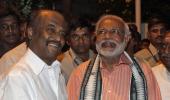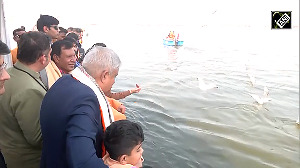Rajinikanth seems to have ended the recently-revived speculation about his imminent launch into direct politics, unlike in the past, when he had expressed specific or indirect support one or the other of the two ‘Dravidian majors’, says N Sathiya Moorthy.

After dilly-dallying for years and decades, and thus keeping his fans’ hopes and aspirations alive, Tamil cinema’s superman Rajinikanth seems to have finally called it quits.
In doing so, he also seems to have cautioned cinematic compatriot-cum-competitor in Kamal Haasan about it all, but in his round-about, philosophical way, as always.
By doing so at the birth anniversary celebrations of thespian Sivaji Ganesan, with Kamal Haasan too reacting in his equally inimitable, even otherwise incomprehensible way, the two top guns of Tamil cinema re-directed the controversy attending on the failure of Chief Minister Edappadi K Palaniswami not being present at the much-delayed inaugural of the much-delayed Sivaji Ganesan memorial, sponsored by the late chief minister and co-star Jayalalithaa years ago.
In his speech Rajinikanth said he was not tuned to having one foot each in cinema and politics, and he guessed Kamal Haasan knew how to do it. “Maybe, if I had asked him a couple of months ago, he might have taught me, but not now,” he said, in an obvious reference to Kamal’s more frequent tweets and talks on state politics, the earlier ones specifically targeting the AIADMK state government.
With this, Rajinikanth seems to have ended the recently-revived speculation about his imminent launch into direct politics, unlike in the past, when he had expressed specific or indirect support one or the other of the two ‘Dravidian majors’.
Over the past nearly 25 years, Rajini himself would often kick-start such speculation about imminent entry into politics before the launch/release of his big-budget movie and/or through a punch-line or two, on-screen. By now, his fans and the Tamil media are both tired of his pronouncement so much so, his recent return to the subject earlier this year was received with a lot of social media derision and fan negativity.
It was, however, a new role for Kamal, who occasionally used to touch upon ideological issues like his atheism and closer identification with DMK leader and yesteryear playwright-politician, former chief minister M Karunanidhi.
Today, when Kamal Haasan is talking about direct entry into politics and his interest in becoming chief minister, critics, especially from the ruling AIADMK, specifically question him why in the past he had raised his voice only when his films faced problems from politicians, and not otherwise.
Independent of their personal appeal and constantly-expressed desire for serving social causes and public good, today both actors, past their prime, are ‘non-saleable’ political products than a generation ago. The present day, new-generation voters too have learnt to separate a good actor from a good-hearted actor, the latter wanting to don a political role.
Between the two, Rajinikanth is more direct in his mass appeal, and can also speak openly and directly to his fans and a larger audience, as and when he chose to do so. Kamal, on the contrary, has always painted a personal picture of added confusion, as evinced through his words.
Suffice to point out that fans went into ruptures over a scene in the 2010 Arya-Santhanam starrer, Boss engira Bhaskaran, when the side-kick tells the hero how at times he was talking as unintelligibly as Kamal Haasan. Obviously, Kamal too enjoyed the joke, as unlike many others in his position, he did not adversely react to it.
This being the general feeling, despite the state as a whole celebrating him as an actor par excellence next only to Sivaji Ganesan, political analysts also point to his inability to make eye contact with his audience, particularly in these days of drawing-room conversation through television news channels.
Kamal’s seeming confusion in communicating his ideas and giving them as convincing an expression as he is otherwise capable of on the silver-screen is also not working in his favour.
Also, unlike those already in active politics, with the more important of them having alternated in the seat-of-power over many decades now, convincing the voter of his honest intentions and decisive approach to decision-making, these are qualities he has to prove long before reaching there.
As of today, Kamal Haasan could be compared to Sivaji Ganesan, not only in film-acting but also in politics, where the latter could not make it as big as compatriot-competitor, the late chief minister and AIADMK founder, M G Ramachandran, precisely for these reasons.
From among the main political players, it is not unreasonable to compare Rajinikanth all along and Kamal Haasan in more recent weeks to the late Congress veteran, G K Moopanar, when it comes to combining decency in politics with a confused approach to decision-making at every turn.
Like Sivaji Ganesan, whom he considered as his political competition within the Opposition Congress of the seventies, Moopanar was doomed as a leader, particularly in a state where the likes of Karunanidhi and MGR earlier, and Jayalalithaa were seen as strong leaders providing stable leadership/government to Tamil Nadu in their time.
Compared to Rajnikanth all along and Kamal Haasan now, at least that traditional 10-per cent of the state’s voters always wanting change from the status quo were ready to bet on another actor-politician, Vijaykanth, who followed up his long silver-screen social heroism with a swift launch of a separate political party in the Desiya Murpokku Dravidar Kazhagam.
They stuck to Vijayakanth until he decided to fail himself and the party by growing too big for his boots, and thus failed the party. Even while patently acknowledging that he needed to align with either of the ‘Dravidian majors’ to go beyond the 10-per cent voter-support recorded in elections 2009 to the Lok Sabha, he began behaving as if he was the strongest of them all -- and is now paying the price for the same.
In comparison, neither of the two superstars of Tamil cinema have it in them even to attract those 10 per cent votes automatically, unlike what at least Rajinikanth would have done even a decade ago, but no more. Kamal Haasan remains a non-starter, and with his chief ministerial ambitions will have to do much better than anyone else already in the fray -- including incumbent Edappadi and DMK’s MK Stalin.
Over the past years, both fans and voters alike began waiting for Rajinikanth’s next politically-tinged declaration ahead of his next movie launch only with derision and disdain.
This was distinctively different from his early forays of the kind, in the mid-nineties, when a substantial section actually believed that with his honest approach and frankness to expression, he could make a good chief minister.
Today, they have begun looking at Kamal Haasan’s announcements, too, as ‘commercial breaks between the high-power and low-esteem politics of disqualification and privilege motions’ involving chief minister Palaniswami’s camp on the one hand and the rival AIADMK faction and the DMK political Opposition, on the other.
N Sathiya Moorthy, veteran journalist and political analyst, is Director, Observer Research Foundation, Chennai Chapter.











 © 2025
© 2025